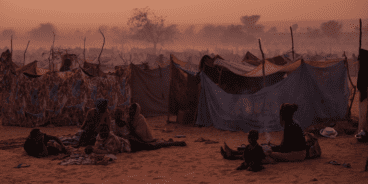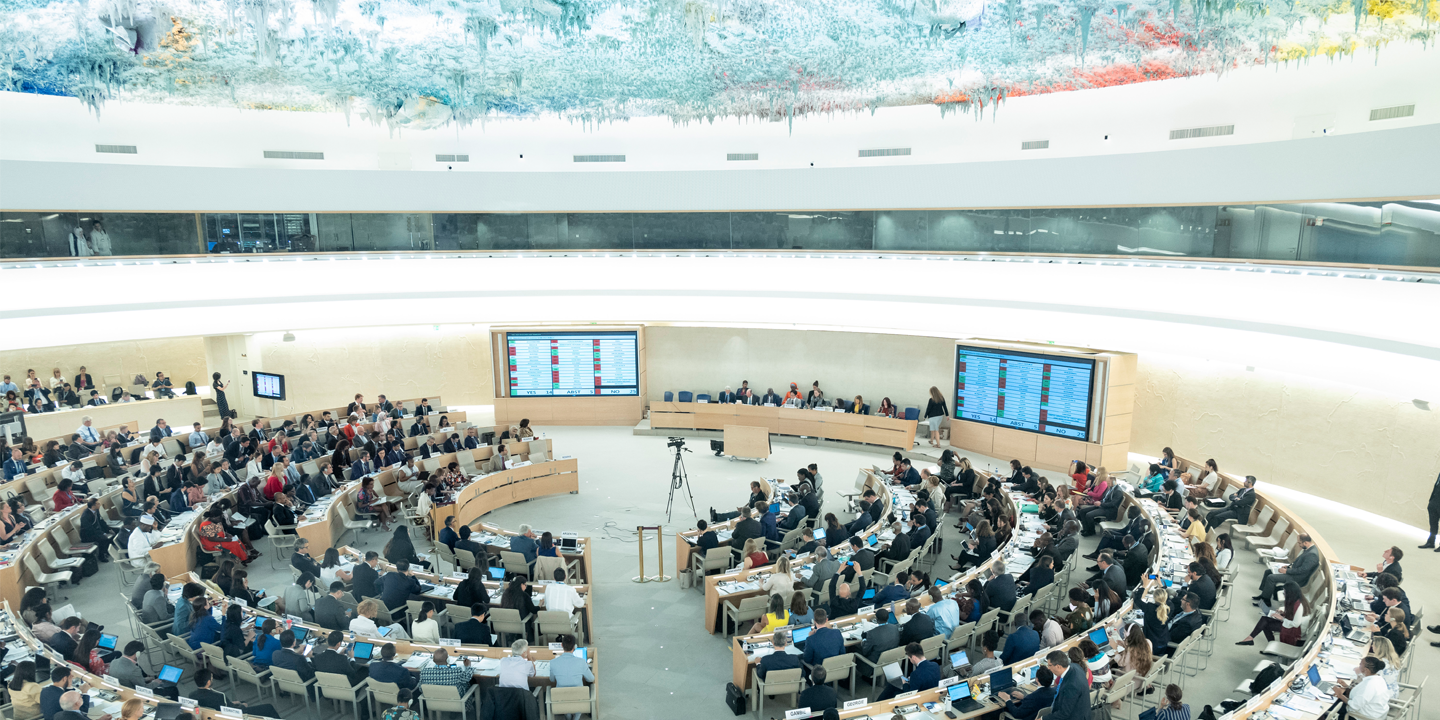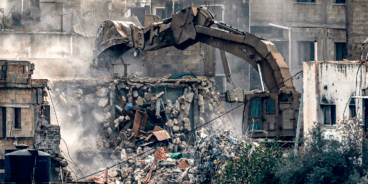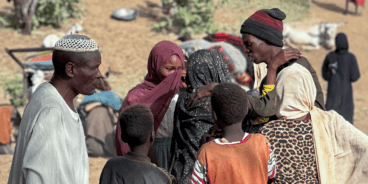

Letter to UN Human Rights Council members on atrocity prevention priorities at the Council’s 56th session
Your Excellency,
On behalf of the Global Centre for the Responsibility to Protect, I am writing to you regarding the 56th session of the UN Human Rights Council (HRC) in Geneva.
The HRC plays an essential role in the prevention of mass atrocity crimes by responding to situations where populations are at risk of, or are experiencing, genocide, war crimes, crimes against humanity or ethnic cleansing. During its 44th session in July 2020 the HRC adopted Resolution 44/14 on the Responsibility to Protect, recognizing the important contribution of the UN human rights system in addressing situations where there is a risk of atrocity crimes being committed. This is in line with the Council’s prevention mandate, enshrined in UN General Assembly Resolution 60/251, which stipulates that it shall “contribute, through dialogue and cooperation, towards the prevention of human rights violations and respond promptly to human rights emergencies.”
We strongly urge you, as a current member of the HRC, to uphold this shared commitment to prevent atrocity crimes. The Global Centre respectfully encourages you to consider the following recommendations as you engage in the 56th regular session:
Eritrea
The government of Eritrea is responsible for systematic and widespread human rights violations that may amount to crimes against humanity. According to the 2016 report of the HRC-mandated CoI on Eritrea, the government and ruling party, the People’s Front for Democracy and Justice, have perpetrated crimes of enslavement, imprisonment, enforced disappearance, torture, persecution and murder since 1991. The CoI also reported that high-level officials authorized sexual violence as a method of punishment in compulsory military service camps – where conscripts are subjected to indefinite periods of national service – and concluded that these crimes amount to sexual slavery and torture.
Minority religious groups have been targeted for persecution. Eritrea has four government-sanctioned religious groups allowed to openly practice their faith while others are forcibly suppressed and, in some cases, adherents have been deprived of citizenship. Eritrean armed forces are also responsible for violations of international law committed in the Tigray region of Ethiopia, and since November 2020 have allegedly massacred civilians, perpetrated widespread rape and sexual violence and participated in the refoulment of Eritrean refugees.
On 6 May 2024 Eritrea had its fourth Universal Periodic Review. The review confirmed the authorities’ failure to implement recommendations from previous cycles, as well as the 2016 CoI report, such as implementation of the 1997 Constitution, initiating legal reform, addressing the lack of civic space and ending indefinite conscription into the national service, violence against women and girls, and torture and ill-treatment. Eritrea continues to be unwilling to cooperate with the UN human rights system, remaining one of the few countries who has never allowed any visit by a Special Procedure mandate holder.
In light of ongoing human rights violations and abuses in Eritrea, the Global Centre respectfully urges you to adopt a resolution to extend the mandate of the Special Rapporteur for a period of one year and call upon the Eritrean government to fully and transparently cooperate with UN processes and mechanisms. As 2024 marks 10 years since the establishment of the CoI on Eritrea, this year’s resolution should request the Special Rapporteur to conduct a stock-taking assessment examining how Eritrea’s human rights situation evolved during this time and what accountability options and processes are available to address human rights violations and abuses, including those identified by the CoI. The resolution should further request the UN High Commissioner for Human Rights and the Special Rapporteur to present updates at the HRC’s 58th session in an Enhanced Interactive Dialogue. This appeal echoes a joint NGO call on 28 May 2024.
Occupied Palestinian Territory
Since 7 October 2023 Israel has conducted a relentless bombardment campaign from air, land and sea across the Gaza Strip in response to Hamas’ horrific and deadly assault. For over seven months, Israel has targeted and destroyed civilian objects protected under International Humanitarian Law (IHL) in a manner widely characterized as collective punishment. As of 15 May, over 35,000 Palestinians have been killed, approximately 70 percent of whom are women and children, while approximately 10,000 more individuals are likely missing or buried under rubble of destroyed buildings. Over 70 percent of civilian infrastructure has been destroyed and several hospitals have been besieged and forcefully evacuated by the Israeli military. In the aftermath of these attacks, at least seven mass graves have been discovered across hospitals in Gaza, with many of the 520 bodies recovered showing signs of torture and summary executions. Approximately 1.7 million Palestinians are internally displaced in Gaza and facing successive evacuation orders by the Israeli military. The so-called safe areas lack the capacity to assure any safety or security and are regularly hit by airstrikes and missiles. Famine is imminent or likely already underway in Gaza as a result of Israel’s extensive restrictions on the entry and distribution of aid and commercial goods, as well as its destruction of vital civilian infrastructure. Since January there have been patterns of Israeli attacks on aid warehouses and against Palestinian civilians collecting or seeking aid. Meanwhile, existing patterns of violence by Israeli settlers in the Occupied West Bank have also escalated since 7 October, with Palestinians facing an average of four attacks per day.
The UN Special Rapporteur on the situation of human rights in the Occupied Palestinian Territory (OPT) has concluded that Israel has committed at least three of the constitutive acts of genocide in Gaza, and that statements made by high-level Israeli military and government officials are evidence of genocidal intent. Other UN Special Procedures have also issued multiple warnings regarding a risk of genocide against the Palestinian people. Meanwhile, South Africa initiated proceedings before the International Court of Justice (ICJ) concerning alleged violations of Israel’s obligations under the Genocide Convention in relation to Palestinians in Gaza. The ICJ has issued legally binding provisional measures ordering Israel, among other requests, to ensure its military does not commit acts which constitute a violation of the rights of Palestinians in Gaza as a protected group under the Genocide Convention and to provide basic services, including humanitarian aid, to address adverse conditions of life in Gaza.
As Israeli forces intensify bombardments and ground operations across Gaza, the Global Centre respectfully urges your delegation to use the upcoming Interactive Dialogue with the Commission of Inquiry (CoI) on the OPT, including East Jerusalem, and Israel to call for an immediate and permanent ceasefire in Gaza, monitored by an independent, international body. We also urge your delegation to call on Israel to immediately lift the siege of Gaza, ensure safe and unimpeded access for the delivery of humanitarian aid and immediately implement the ICJ’s provisional measures orders. We further urge your delegation to cease arms exports to Israel to avoid aiding and abetting atrocities in Gaza and apply other economic and political measures necessary to ensure respect for international law and the implementation of the legally binding UN Security Council Resolution 2728 by all parties and those supporting them.
Sudan
Since April 2023 an armed confrontation between the Sudanese Armed Forces (SAF) and the paramilitary Rapid Support Forces (RSF) has resulted in tens of thousands of people killed or injured amidst heavy fighting, aerial bombardments and shelling, including in densely populated areas of Sudan. There have been reports of armed actors perpetrating widespread sexual and gender-based violence, including rape, as well as reports of forced evictions in Khartoum and other cities. Fighting between the SAF and RSF has triggered an alarming escalation in inter-communal and ethnically motivated violence in various parts of the country, particularly in the Darfur region, where the RSF and Arab affiliated militias are targeting civilians from Massalit and other non-Arab communities on the basis of their ethnic identity, possibly amounting to the crime of genocide.
During April and May 2024, violence dramatically escalated across North Darfur posing an imminent threat of atrocities to civilian populations. Several senior UN officials have raised alarm about the escalation of violence and imminent attack on El Fasher. Indiscriminate airstrikes and the deliberate targeting of communities in and around El Fasher has led to civilian deaths and the destruction of towns and villages.
Following a joint call by NGOs and a special session held in May 2023, the HRC established an international independent Fact-Finding Mission (FFM) for Sudan. With a mandate to investigate human rights and IHL violations and preserve evidence for future legal proceedings, among other tasks, the FFM has a crucial role to play in delivering justice. As conflict and atrocities continue unabated in Sudan, thorough investigations by the FFM remain crucial. However, the FFM remains understaffed and under-resourced and thus unable to effectively implement and execute its mandate. Considering both the gravity of the situation and the impact of the UN’s liquidity crisis on resourcing, we urge your delegation to support the extension of the FFM for at least one year to allow it to pursue its work, as well as request regular updates and interactive dialogues at the HRC. We also urge your delegation to emphasize that the HRC will remain actively seized of the matter, including by assessing the developing situation and appropriate responses, which could include further extensions of the FFM’s mandate. It is also important that states pay their contributions to the UN in full to resolve the liquidity crisis and allow the FFM, other independent investigations and human rights bodies and mechanisms to fulfill their respective mandates. Lastly, the Global Centre urges your delegation to raise awareness about the atrocity risks populations are facing across Sudan, including war crimes, crimes against humanity and possible genocide. This is in line with a joint NGO call on 17 May.
Venezuela
Since its establishment in 2019 the HRC-mandated FFM on Venezuela has frequently warned that ongoing state-led repression and systematic human rights violations in Venezuela are part of a plan “orchestrated at the highest levels of the government to repress dissent through crimes against humanity,” which have been committed since at least 2014. Ahead of presidential elections on 28 July 2024, government repression has significantly intensified, following patterns exhibited in previous voting cycles. The FFM warned that the authorities have reactivated “the most violent form of repression” aimed at silencing opposing voices at any cost, while the UN Working Group on Enforced or Involuntary Disappearances warned that opposition members and the military are the primary targets of an alarming rise of enforced disappearances, which “appear to follow a pattern whereby individuals are deprived of their liberty by State authorities, taken to recognized detention facilities and denied fundamental rights and protections.” Amid ongoing harassment and threats against political opponents, on 26 January 2024 the Supreme Court upheld a ban on the leading presidential opposition candidate, María Corina Machado, and in late March the National Electoral Council refused the registration of her chosen replacement candidate. As part of a strategy to harness fear and self-censorship among independent voices, since January the government has also announced plans to expedite the adoption of several draft legislations which would further close civic space and facilitate the criminalization of actual or alleged opponents. Venezuelan NGO Provea recorded 230 attacks against human rights defenders in February alone.
Following the Office of the UN High Commissioner for Human Rights’ (OHCHR) denunciation of the short-term enforced disappearance of prominent human rights defender Rocío San Miguel, on 15 February Venezuelan authorities gave its team 72 hours to leave the country. While OHCHR staff continues critical monitoring and reporting from Panama, its suspension from Venezuela has resulted in critical protection gaps for vulnerable communities across the country. During an official visit to Venezuela in April, the Chief Prosecutor of the International Criminal Court (ICC) inaugurated an in-country office in Caracas, while emphasizing that investigations into possible crimes against humanity will be pursued “simultaneously, and without delay.” On 1 March the ICC Appeals Chamber rejected Venezuela’s appeal against a previous assessment by the Court that domestic investigations are insufficient. The FFM previously found that Venezuela’s judicial system is perpetuating impunity for possible atrocity crimes, and domestic avenues for justice and accountability remain elusive.
Intensifying repression and targeted persecution all constitute early warning signs of a rapidly deteriorating situation and a possible recurrence of atrocity crimes. The HRC’s existing investigation, protection and reporting architecture – including the FFM – are vital to ensure maximum international scrutiny and deter high level perpetrators from further intensifying repression, while prospects of cooperation with the ICC and OHCHR provide vital entry points for the international community to push for meaningful, transparent and genuine engagement with such mechanisms. We therefore urge your delegation to utilize the upcoming Interactive Dialogue with the UN High Commissioner for Human Rights to highlight the importance of ongoing investigations by the FFM – in addition to critical monitoring and reporting by OHCHR – to prevent the recurrence of crimes against humanity and alert the international community to appropriate prevention strategies, including before, during and after election day. We also urge your delegation to insist on the return of an effective OHCHR presence in Venezuela – without concessions on its existing protection, monitoring and reporting mandate – and insist on the need to renew the mandate of the FFM in full at the upcoming 57th session in September.
Related Content


World Leaders Must Act to End Israel’s Unlawful Presence in the Occupied Palestinian Territory
